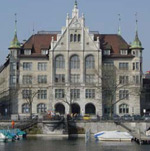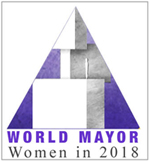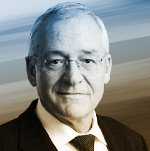
Zurich City Hall (Stadthaus) was built in 1883/84 and is home to the Mayor and his administration

FRONT PAGE
About World Mayor




Please nominate your candidate for the 2018 World Mayor Prize

• VOTE NOW
• The 2014 short list
• The 2014 longlist
• Code of Ethics
• The World Mayor Prize

The 2012 results
The 2012 project
The 2012 shortlist
The 2012 long-list
Code of Ethics | Código de Ética |
The World Mayor Prize
World Mayor Prize winners exchange letters

The 2010 results
The 2010 project
The 2010 finalists
Code of Ethics | Código de Ética |
The World Mayor Prize
Marcelo Ebrard says thank you
Mick Cornett says thank you
Helen Zille and Marcelo Ebrard exchange letters

Shortlist of candidates
Code of Ethics
The World Mayor Prize
With Mayor of Cape Town
With Mayor of Zurich

On Mayor of Cape Town
On Mayor of Chacao
On Mayor of Gothenburg
On Mayor of Guayaquil
On Mayor of Marikina City
On Mayor of Memphis
On Mayor of Nuremberg
On Mayor of Phoenix
On Mayor of Porto Alegre
On Mayor of Tehran
On Mayor of Villa Nueva
On Mayor of Zurich

The 2006 results
Methodology
The 2006 finalists
The World Mayor Award
Dora Bakoyannis congratulates John So

The 2005 results
Contest methodology
List of finalists
Winning mayors write
Mayor Rama writes - Mayor Bakoyannis replies

The 2004 contest
List of all 2004 finalists
Edi Rama wins 2004 award
People ask - Edi Rama replies

Front Page
Site Search
About City Mayors
Zurich Mayor Elmar Ledergerber
questioned by an international audience
City Mayors invited those who participated in World Mayor 2008 to put questions to Zurich Mayor Elamr Ledergerber, runner-up in World Mayor 2008. From the questions received, a representative selection was forwarded to the Mayor. Below, he replies in detail, as well as with candour and thoughtfulness.
Questions & Answers
From Gisela K, Zürich
Question: Mr Mayor, what made you enter local government and what are your future plans?
Elmar Ledergerber replies: After several years on the national political stage, the challenge to govern the biggest city in Switzerland attracted me greatly, especially since it is my hometown. The Mayor of Zürich has many very different responsibilities, from representative duties to management functions and daily problem-solving. It is this diversity that is challenging and satisfying. As far as the future is concerned, I’m looking forward to spending my days in a more leisurely way: collecting mushrooms in the forest, hiking on a sunny day or sailing on the beautiful Lake Zürich.
From Jason F, London, UK
Question: Zürich is often voted as one the best cities in the world. Would you say being Mayor of Zürich is therefore a relatively easy job?
Elmar Ledergerber replies: It is definitely not an easy job. By combining far-sighted and balanced measures with constant renewal and innovation, we continue to keep living standards high and thus attract further business and residents to the city. This does not leave the city without its problems, It demands a high level of dedication. Up to 80 or even more hours worked per week are a normal standard. Fortunately, the city council consists of nine members in total. Together we do what we can to not only maintain but to enhance the level achieved.
From Monika M F, Zürich
Question: Do you claim any credit for Zürich being the best city in the world?
Elmar Ledergerber replies: I only claim the wise choice of living here myself. As mentioned before, there are many factors that contribute to Zürich being judged so positively: good employment and working conditions, a stable political and secure legal environment, the compact size of the city itself, a thriving cultural and art scene, beautiful scenery, and so on. Many of these factors cannot be influenced directly, but are groomed over a long time. But the Mayor of Zürich and the city council can facilitate this process.
From Dr Carl B, Zürich
Question: How will the global financial crisis affect Zürich? Do we need to prepare for more difficult times?
Elmar Ledergerber replies: The banks and the financial industry are for the City of Zürich a cluster benefit in good times and a cluster risk in difficult times. In 2008, the City of Zürich will collect 310 million Swiss Franks less in tax money than expected. Thanks to our financial reserves, we can cope with this decline without having to cut down on our services to the local community and economy, at least in the short term. But in the long term we need to develop other fields of economy such as tourism and the creative industries or life sciences in order to diversify and minimise the risk.
From Jean-Paul, Strasbourg, France
Question: Would Zürich benefit if Switzerland joined the European Union (EU)?
Elmar Ledergerber replies: Yes. In some areas, it certainly could, in the way that it would reduce certain obstacles that today still persist. For example, the constraints imposed on Zürich’s airport by the German government. But one shouldn’t forget that there has always been a strong connection between the European Union and Zürich. One could even say the EU started here, with Sir Winston Churchill’s famous speech ‘Let Europe arise’ in 1946.
Today, 30 per cent of the city’s population are foreigners. The European Union is Switzerland’s biggest importer as well as exporter of agricultural and food products. The two economies are strongly interrelated and will certainly continue its positive cooperation. Not to forget the geographical situation: Zürich is situated at the very heart of Europe.
From Catherine W, London, UK
Question: Mr Ledergerber, would you say Euro2008 was a successs for Zürich? What are its long-term benefits for the city?
Elmar Ledergerber replies: Yes, I would definitely say that EURO 2008 was a success for Zürich. We had the once in a lifetime opportunity to present our beautiful city, with its scenery, lively culture and friendly people, to billions of people worldwide! This kind of exposure is priceless and could never have been achieved through other means such as image campaigns.
Personally, I enjoyed the growing excitement before the kick-off and the positive feedback we received from visitors from all over the world, as well as the local community. But most impressive of all, was to watch all the hundreds of volunteers in their daily efforts to make everyone feel welcome: they put such enthusiasm and effort into their (unpaid) work, simply for the pleasure of being part of it all.
From Paolo, Turin, Italy
Question: What do you as mayor do to reduce the carbon footprint of Zürich and its citizens?
Elmar Ledergerber replies: One of our main goals in the ongoing legislative period is sustainability. We want to develop the City of Zürich towards the idea of the 2000-Watt society. From 2000 to 2004 we scaled down the city’s carbon footprint by 8.8%. Until 2020 we shall strive for a reduction of 15% compared with 2005. One of our most ambitious projects in this field is the reorganisation of the city’s biggest hospital in accordance with the principles of the 2000-Watt society. Furthermore, the City of Zürich provides a first class public transport system in order to reduce traffic caused carbon emissions. Personally, I frequently use a bicycle rather than a staff car.
From Anne A N, San Francisco, USA
Question: What can a rich city such as Zürich do to help cities in developing countries adopt green policies?
Elmar Ledergerber replies: The City of Zürich has just celebrated its 25th anniversary of the city partnership with Kunming in China. This cooperation has since the beginning been very fruitful, with an active exchange of ideas and knowledge on green policies. The city of Zürich has assisted Kunming mainly with technical expertise in the fields of water resources and waste management, public transport and regional development, thus contributing to a sustainable ecological and social development in China. In many fields, Kunming today has become a role model for other cities in China and Asia. Sharing know-how and expertise is probably the best way to promote the idea of sustainability.
From Hans Z, Zürich
Question: Zürich is the drug capital of Switzerland. Has drug dealing and use spun out of control? Can the city do anything to reduce illegal drug taking and dealing?
Elmar Ledergerber replies: It is true, drug trafficking and consumption is a problem in Zürich as in all major cities. But the situation is far from being out of control, and not more a problem than in other cities. The situation today is not comparable with the early nineties. Since then, the city’s drug policies have changed dramatically and are now being based on prevention, therapy, emergency aid and repression. This strategy combines preventive, medical, social and police measures, which demonstrates the consensual effort necessary to fight the drug problem as such. Drug dealing and drug use are burdens, all inner cities in the region have to cope with.
From Jasmine L B, Zürich
Question: What will Zürich be like in 100 years time?
Elmar Ledergerber replies: An even better and greener city, certainly still governed by a left wing party. But seriously, future predictions are very difficult. What we can do, and have done, is developing a vision for 2025. There have been three main questions leading to the development of strategies: On what do we live tomorrow? How do we live? And how are we organised? The defined goals and guidelines will help Zürich face future challenges and continue its development towards a sustainable metropolis. (See also: Strategies Zürich 2025: http://www.stadt-zuerich.ch/internet/lsp/home/zuerich_2025.html)

Elmar Ledergerber, Mayor of Zürich and runner-up of World Mayor 2008. He has been awarded the World Mayor Commendation
Introducing
Elmar Ledergerber
As Mayor of Zurich, Elmar Ledergerber pursues policies of growth and development for the city, with sustainability forming an essential issue in all aspects of politics. Born in 1944, Elmar Ledergerber has a university degree in history and literature as well as in economics. He focused his studies on foreign trade and the economics of developing countries. He obtained his PhD in economics at the university of St. Gallen/Switzerland. In 1977 he established a consulting firm, which he managed for more than twenty years.
He has worked as a consultant in various fields, including energy policy, the environmental impact of economic growth, economic development and the evaluation of development projects. Elmar Ledergerber is also member of the board of Administration of Airport Zurich and President of the board of administration of Intercooperation, a Swiss NGO that is engaged in various projects in developing countries. He is a member of the Social Democratic Party. More
